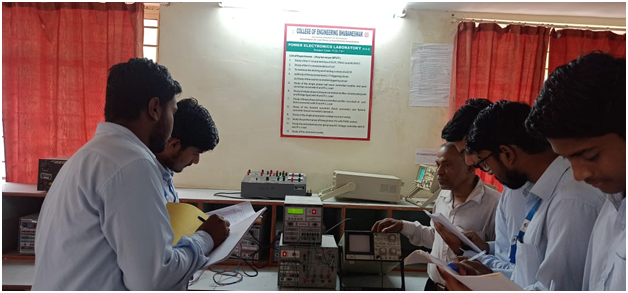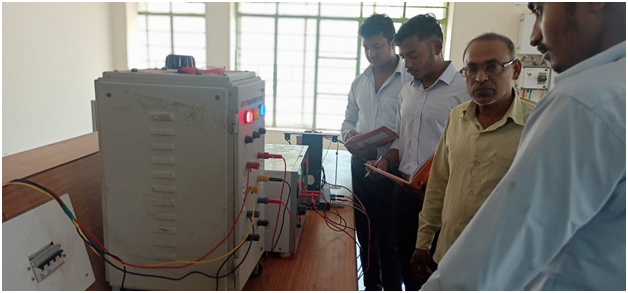Laboratories
The laboratories at the Electrical Engineering department are designed to provide students with hands-on experience. Students can utilize the laboratories to put theory into practice and to apply their understanding of theory to various courses of their course outcomes.
Department Laboratories
Objective:
The main objective of the Electrical Machine Laboratory is to
 Enhance the knowledge about the characteristics and operation of the machines.
Enhance the knowledge about the characteristics and operation of the machines.  Familiarize with the constructional details of different types, working principle and their performance.
Familiarize with the constructional details of different types, working principle and their performance.  Provide experimental and hands-on experience to the detailed study of characteristic and operational aspects of both AC & DC electrical machines.
Provide experimental and hands-on experience to the detailed study of characteristic and operational aspects of both AC & DC electrical machines.
Equipments:
DC Shunt Motor - Generator Set, DC Shunt Motor - Series Generator Set, DC Shunt Motor - Generator, Identical DC Shunt Machines, Identical DC Series Machines, DC Shunt Motor, Single phase transformer, three phase transformer, Induction Motors, three phase synchronous motor, Alternator Sets .

Download Lab Contents
Objective:
The objective of this lab is to
 Study switching device characteristics and their applications in rectifiers, AC voltage controllers, inverters, and choppers.
Study switching device characteristics and their applications in rectifiers, AC voltage controllers, inverters, and choppers. Know the use of electronic equipments for electric power conversion, control and conditioning.
Know the use of electronic equipments for electric power conversion, control and conditioning.  Help students understand the operation, characteristics and performance parameters of controlled rectifiers by providing an overview of several types of power semiconductor devices. Investigate the theory of operation, switching strategies, modulation techniques, and harmonic reduction approaches in PWM inverters.
Help students understand the operation, characteristics and performance parameters of controlled rectifiers by providing an overview of several types of power semiconductor devices. Investigate the theory of operation, switching strategies, modulation techniques, and harmonic reduction approaches in PWM inverters. Provide hands-on experience with components including motors, batteries and power semiconductors.
Provide hands-on experience with components including motors, batteries and power semiconductors.
Equipments:
Silicon controlled rectifier, TRAIC, DIAC, MOSFET and IGBT Characteristics study unit, Operational Amplifier Trainer, DC Chopper power unit, UJT firing circuit, fully controlled converter power circuit, Half controller converter power circuit, Series Inverter, AC voltage controller, Cosine firing angle circuit, Buck-boost converter, Three-phase half, semi & full converter.


Download Lab Contents
Objective:
The Control Systems laboratory's goal is to
 Give solid understanding of the fundamental ideas of linear control theory and control system design, as well as to comprehend the methods for representing systems and obtaining their transfer function models.
Give solid understanding of the fundamental ideas of linear control theory and control system design, as well as to comprehend the methods for representing systems and obtaining their transfer function models. Help students comprehend the notion of control system stability by facilitating fundamental understanding in getting open loop and closed loop answers.
Help students comprehend the notion of control system stability by facilitating fundamental understanding in getting open loop and closed loop answers.  Aid students in their studies of system compensation design.
Aid students in their studies of system compensation design.
Equipments:
Linear System Simulator Kit, PLC Trainer Units, PID Controller Trainer Kit, Temperature Control System Study Kit, Servo Motor etc.


Download Lab Contents
Objective:
The aim of the Network Devices Laboratory is to reinforce the students with an adequate work experience in the circuit theory and also to expertise in handling the instruments involved. The Superposition Theorem, Thevenin Theorem, Norton Theorem, Hysteresis Loop etc are practically realized and validated. It also provides facilities to train the students in the measurement of resistance, inductance etc. and to give exposure to AC, DC bridges and transient measurement.
Equipments:
Superposition Theorem kit, Norton Theorem kit, Coupled circuit, Low pass & High pass filter, Voltmeter, Ammeter, Multimeter etc.

Objective:
 Implement different circuits and verify circuit concepts for DC circuits.
Implement different circuits and verify circuit concepts for DC circuits.  Measure the impedance of series RL, RC and RLC circuits.
Measure the impedance of series RL, RC and RLC circuits. Prove the various theorems used to reduce the complexity of electrical network.
Prove the various theorems used to reduce the complexity of electrical network. The operation and characteristics of AC machines and DC machines.
The operation and characteristics of AC machines and DC machines.
Equipments:
Different types of Dc motors, Dc generators, Single phase energy meter, Series RLC Circuits, Single phase Induction motors, Single phase transformers, Voltmeters, Ammeters, Wattmeters etc.

Download Lab Contents
Objective:
 To impart the fundamental knowledge on using various analytical tools for Engineering Simulation.
To impart the fundamental knowledge on using various analytical tools for Engineering Simulation. To know various fields of engineering where these tools can be effectively used to improve the output of a product.
To know various fields of engineering where these tools can be effectively used to improve the output of a product. To impart knowledge on how these tools are used in Industries by solving some real time problems using these tools.
To impart knowledge on how these tools are used in Industries by solving some real time problems using these tools.

Objective:
This laboratory is equipped with advanced STM-32 microcontroller where the students and faculty members can accomplish their projects and research work respectively.

 Student Login
Student Login Employee Login
Employee Login
